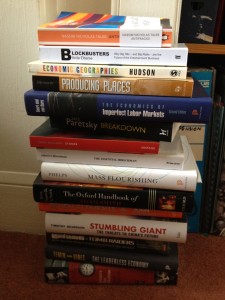It’s a mistake to read the review sections of the weekend papers, as there are always more new books that I want to read than time available to read them. My in-pile is already teetering.

Teetering
Still, several reviews today have aroused my interest, albeit none directly about economics and business. The FT reviews Margaret Macmillan’s new history of the First World War, [amazon_link id=”184668272X” target=”_blank” ]The War That Ended Peace[/amazon_link], which might be the only one of the torrent of books published for the next four years of anniversaries that I want to read. Otherwise, I might rest on having read Alan Moorehead on [amazon_link id=”0060937084″ target=”_blank” ]Gallipoli[/amazon_link], Paul Fussell’s [amazon_link id=”0195133323″ target=”_blank” ]The Great War and Modern Memory[/amazon_link], and Pat Barker’s [amazon_link id=”0141030933″ target=”_blank” ]Regeneration[/amazon_link] trilogy (her latest, Toby’s Room, is good but not classic).
[amazon_image id=”184668272X” link=”true” target=”_blank” size=”medium” ]The War that Ended Peace: How Europe abandoned peace for the First World War[/amazon_image]
Robert Harris has a new novel out on the fantastically important and interesting Dreyfus Affair, [amazon_link id=”0091944554″ target=”_blank” ]An Officer and a Spy[/amazon_link]. And I’d quite like to read Jonathan Franzen’s [amazon_link id=”0007517432″ target=”_blank” ]The Kraus Project[/amazon_link]. Most of what I know of Kraus comes from having read Clive James’s superb [amazon_link id=”0330418866″ target=”_blank” ]Cultural Amnesia[/amazon_link]. And The Economist reviewed very favourably David Runciman’s [amazon_link id=”0691148686″ target=”_blank” ]The Confidence Trap[/amazon_link].
[amazon_image id=”0691148686″ link=”true” target=”_blank” size=”medium” ]The Confidence Trap: A History of Democracy in Crisis from World War I to the Present[/amazon_image]
